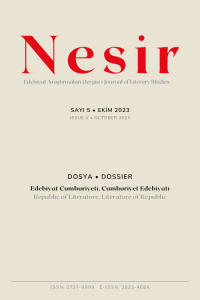Abstract
Bu yazıda Esra Dicle tarafından hazırlanan Edebiyatın Duygu Haritası başlıklı kitap değerlendirilmiştir. Kitapta edebiyat eleştirisi alanının duygu çalışmalarına açacağı imkânların peşinden gidilerek aklın hükümranlığı, her şeyin ölçüsü olarak kabul edilen insan ve insana dair kabuller sorgulanmış; insan ve insan dışı aktörlerin dolaşıklığında duygulara bakılarak bir kartografya çalışması yapılmıştır. Çalışmada yazıları yer alan yazarlar tarafından duyguların ne söylediği, nasıl algılandığı, “(biz)”e ne yaptığı gibi sorular etrafında toplumsal cinsiyet normlarının yarattığı tahakküm mekanizması, kadın-erkek, duygu-akıl gibi ikilikler, kapitalizmin ürettiği matrisler çeşitli ilişkisel ağların izi sürülerek sorgulanmıştır.
Keywords
References
- Dicle, Esra. Edebiyatın Duygu Haritası. İstanbul: Dergâh Yayınları, 2022.
Esra Dicle, Edebiyatın Duygu Haritası [The Emotional Map of Literature] (İstanbul: Dergâh Yayınları, 2022)
Abstract
This article examines a book titled Edebiyatın Duygu Haritasi [The Emotional Map of Literature], prepared by Esra Dicle. The book explores the potential contributions that the field of literary criticism can make to the study of emotions. It questions the dominance of reason, challenges accepted notions about humans and their relationships as the measure of all things, and examines emotions through the lens of both human and non-human actors, resulting in a cartography of emotions. The work delves into what emotions express and how they are perceived by the authors whose writings are included in this study, focusing on questions like what emotions communicate and how they relate to the collective "(us)," thereby examining the dominance of societal gender norms, binary concepts such as male-female, emotion-reason, and the matrices of capitalism through various relational networks. Thus, in this article, the central theme of the book, "emotions," is described within the context of literary criticism as a "homecoming," utilizing the opportunities presented by the field.
Keywords
Literature emotion affect Anthropocene politics collectivism
References
- Dicle, Esra. Edebiyatın Duygu Haritası. İstanbul: Dergâh Yayınları, 2022.
Details
| Primary Language | Turkish |
|---|---|
| Subjects | Literary Theory, Literary Studies (Other), Modern Turkish Literature in Turkiye Field |
| Journal Section | Book Review |
| Authors | |
| Publication Date | October 18, 2023 |
| Submission Date | October 12, 2023 |
| Acceptance Date | October 18, 2023 |
| Published in Issue | Year 2023 Issue: 5 |
Authors retain copyright of the works they submit to Nesir: Journal of Literary Studies, while agreeing to distribute their work under the terms of the Creative Commons Attribution 4.0 International License (CC BY 4.0). Under this license, others may share, reproduce, distribute, and reuse the work, provided that appropriate credit is given to the author(s), the title of the work, and the name of the journal. Nesir holds only the first publishing rights; all copyright remains with the author(s).


